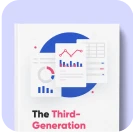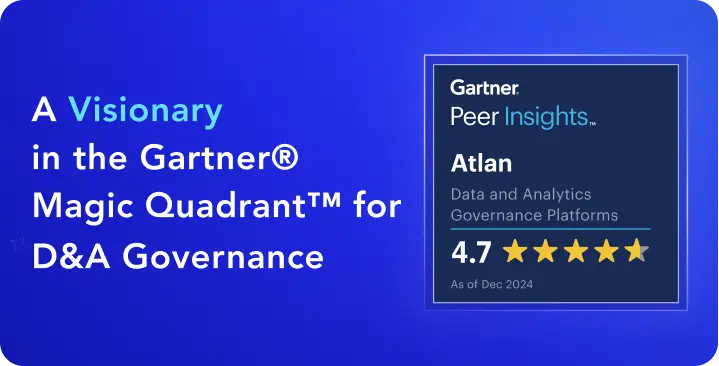Top 10 Benefits of Data Sharing in Business and Healthcare

Share this article
According to Gartner, it was observed that respondents who were successful in enhancing data sharing had D&A teams that were 1.7 times more proficient in delivering tangible and verifiable value to their D&A stakeholders.
Due to this reason understanding the benefits of data sharing becomes more than just a buzzword – it’s a crucial strategy.
Sharing data allows companies to pool strengths for building amazing things, but it’s critical to understand how, why, and potential pitfalls.
Modern data problems require modern solutions - Try Atlan, the data catalog of choice for forward-looking data teams! 👉 Book your demo today
In this article, we’ll explore the myriad benefits of data sharing, its evolution, its impact on contemporary business, hospitals, and the guidelines we should bear in mind.
Let’s dive in!
Table of contents #
- What is data sharing?
- 10 Benefits of data sharing for businesses
- What are the benefits of data sharing in health care?
- Implementing the benefits of data sharing: Best practices for business and hospitality
- 4 Ethical pillars of data sharing in businesses
- In conclusion
- Benefits of data sharing: Related reads
What is data sharing? #
Data sharing is the deliberate act of providing access to specific data sets, either internally within a company or externally to other businesses, partners, or the broader public.
Within an organization, it can bridge gaps between various departments, ensuring that everyone has access to the same valuable insights. Externally, it can facilitate joint ventures, partnerships, and collaborations, enabling multiple entities to benefit from combined knowledge.
The types of data shared can vary widely. They might be raw figures, like sales numbers or customer interactions, or they can be more refined data sets. Regardless of the type, the aim remains consistent: to leverage collective information to optimize decision-making, foster innovation, and enhance the overall value proposition.
For business owners and decision-makers, understanding the importance of data sharing is crucial. It not only opens doors to new opportunities and insights but also promotes transparency and trust, both internally and externally. As the adage goes, knowledge is power, and in the business world, shared knowledge can be the key to unlocking unprecedented growth and success.
10 Benefits of data sharing for businesses #
In today’s fast-paced business environment, efficient information flow is crucial for survival and growth. Data sharing stands at the forefront of this movement, offering businesses multiple advantages.
Here’s an in-depth look at the tangible benefits of data sharing can bring to your business:
- Collaborative growth
- Enhanced decision making
- Increased efficiency
- Fostering innovation
- Improved customer experience
- Competitive edge
- Enhanced supply chain management
- Tailored marketing strategies
- Risk management
- Stakeholder engagement
Let us understand these benefits in detail.
1. Collaborative growth #
- At its core, data sharing fosters a culture of collaboration, breaking down information silos.
- Business impact: By freely exchanging information, businesses open doors to new partnership avenues, explore joint ventures, and can even diversify into uncharted sectors. This synergy can lead to accelerated growth and the fusion of complementary strengths.
- By dismantling information barriers, the benefits of data sharing become particularly pronounced, allowing businesses to leverage each other’s expertise and resources.
2. Enhanced decision making #
- Quality decisions are underpinned by quality data. The benefits of data sharing extend prominently into decision-making processes.
- Business impact: With access to a broader spectrum of data, businesses can achieve a holistic view of the market dynamics, allowing leaders to make strategic moves with confidence. This means fewer shots in the dark and more data-driven, strategic maneuvers, optimizing both short-term and long-term opportunities while mitigating potential risks.
3. Increased efficiency #
- Efficiency is the linchpin of operational excellence.
- Business impact: In operational contexts, the benefits of data sharing can be seen through streamlined processes and the optimal utilization of resources.
- When data flows freely between relevant departments and organizations, it allows for the identification and elimination of redundancies, ensuring that all actions taken are informed and purposeful, thereby maximizing the return on investment and reducing wastage of resources.
4. Fostering innovation #
- Innovation often stems from new, diverse insights, which is one of the primary benefits of data sharing.
- Business impact: Exposure to a varied and extensive range of datasets provides companies with a wealth of insights. These insights can be the catalyst for groundbreaking innovations, propelling businesses ahead of their competition.
5. Improved customer experience #
- In a consumer-centric world, understanding the customer is the key to success.
- Business impact: Shared customer data offers businesses a clearer picture of their target demographics, preferences, behaviors, and pain points.
- The benefits of data sharing in this context allow businesses to understand their consumers at a granular level, adapting their offerings to meet and anticipate consumer demands
6. Competitive edge #
- In the fast-paced world of business, gaining even a slight advantage over competitors can lead to significant growth. Data sharing is a tool that can provide this edge.
- Business impact: When businesses have access to shared industry data, they can quickly discern market trends, identify underserved segments, and pivot their strategies. This agility allows them to capture market opportunities often before their competitors become aware of them.
7. Enhanced supply chain management #
- Ensuring a robust and responsive supply chain is another among the crucial benefits of data sharing.
- Business impact: By proactively sharing data with suppliers, vendors, and partners, businesses can forecast demands more accurately, and ensure that inventory levels are optimized. This leads to cost savings and improved customer satisfaction.
8. Tailored marketing strategies #
- In today’s diverse market, one-size-fits-all approaches rarely succeed.
- Business impact: With the ability to share and access customer behavior data across various platforms, businesses can glean actionable insights. These insights empower marketing teams to craft campaigns that resonate with specific audience segments.
9. Risk management #
- Every business endeavor carries inherent risks. Effective risk management is significantly bolstered by the benefits of data sharing.
- Business impact: Through the sharing of financial and operational data with trusted entities, businesses can harness collective intelligence. This facilitates early identification of potential threats, allowing for timely interventions and strategies that safeguard business interests.
10. Stakeholder engagement #
- Stakeholders, including investors and shareholders, play a pivotal role in a business’s growth trajectory.
- Business impact: Openly sharing pertinent business data offers transparency. This not only bolsters stakeholder confidence but also ensures they are well-informed, fostering a climate of trust and collaboration that can be instrumental for sustained business growth.
In essence, data sharing is not just a technological process but a strategic tool that, when used effectively, can facilitate collaborative growth, and myriad other benefits that permeate throughout a business’s operational, and financial domains.
What are the benefits of data sharing in health care? #
Data sharing in healthcare has numerous benefits, significantly enhancing patient care, research, and the overall efficiency of health systems.
- Improved patient outcomes
- Enhanced research and development
- Public health monitoring and response
- Cost efficiency
- Interoperability and collaboration
- Technology and innovation
- Patient empowerment and engagement
Here’s a detailed look at these advantages:
1. Improved patient outcomes #
- Comprehensive care: Sharing data among healthcare providers gives a more complete view of a patient’s health history, leading to better-informed decisions and more comprehensive care.
- Error reduction: With shared data, there’s a lower risk of errors like duplicate testing or medication mistakes, as all providers have access to the same information.
- Personalized medicine: Data sharing enables more personalized healthcare, where treatments can be tailored to the specific characteristics of an individual patient.
2. Enhanced research and development #
- Accelerated discoveries: Data sharing can significantly speed up medical research by providing researchers with a larger pool of information to study disease patterns, treatment outcomes, and public health trends.
- Clinical trials: It can improve the recruitment of suitable candidates for clinical trials and enhance the monitoring of trial results.
- Drug development: Shared data supports more robust drug development processes by offering insights into effectiveness and side effects across diverse populations.
3. Public health monitoring and response #
- Disease surveillance: Data sharing helps in tracking disease outbreaks and monitoring public health trends, allowing for quicker and more effective responses to health crises.
- Policy making: Governments and public health organizations can use shared data to make informed policy decisions regarding healthcare provision and preventive measures.
4. Cost efficiency #
- Reduced redundancies: By avoiding duplicate tests and procedures, healthcare systems can save significant costs.
- Resource optimization: Shared data allows for better resource allocation and management within healthcare facilities.
5. Interoperability and collaboration #
- Seamless care coordination: Data sharing enhances the ability of different healthcare systems to work together seamlessly, which is crucial for patients receiving care from multiple providers.
- Global collaboration: It facilitates collaboration across borders, essential in handling global health issues like pandemics.
6. Technology and innovation #
- Artificial intelligence and analytics: Shared data fuels AI algorithms and analytics tools, leading to innovative approaches in diagnostics, treatment planning, and predicting health outcomes.
- Healthcare IT development: A robust data-sharing environment encourages the development of more advanced healthcare IT solutions.
7. Patient empowerment and engagement #
- Informed patients: When patients have access to their own health data, they are more informed about their health and can be more engaged in their care.
- Patient-centered care: Data sharing supports a shift towards more patient-centered care models, where patients are active participants in their healthcare decisions.
In summary, data sharing in healthcare serves as a cornerstone for improving patient care, advancing medical research, enhancing public health monitoring, increasing cost efficiency, fostering interoperability, driving innovation, and empowering patients. While it presents immense benefits, it’s also crucial to address challenges related to privacy, security, and standardization to fully harness its potential.
Implementing the benefits of data sharing: Best practices for business and hospitality #
Implementing data sharing effectively in business and hospitality requires careful planning and adherence to best practices. Here’s a detailed look at the strategies and practices that can help maximize the benefits of data sharing in these sectors:
1. Establish clear data governance policies #
- Privacy and compliance: Ensure compliance with data protection regulations like GDPR, HIPAA (for healthcare data), and others relevant to your industry.
- Access control: Implement strict access control policies to ensure that sensitive data is only accessible to authorized personnel.
2. Invest in robust IT infrastructure #
- Secure storage solutions: Use secure, scalable storage solutions to handle large volumes of data.
- High-performance computing systems: Implement high-performance computing systems for efficient data processing and analytics.
3. Data standardization and integration #
- Data formats: Standardize data formats across the organization to facilitate easier sharing and integration.
- Integration tools: Utilize middleware and integration tools to ensure smooth data flow between different systems and departments.
4. Implement advanced analytics and AI #
- Data analytics: Leverage data analytics tools to extract actionable insights from shared data.
- Artificial intelligence: Use AI and machine learning to predict trends, personalize customer experiences, and improve decision-making.
5. Focus on user consent and transparency #
- Informed consent: Always obtain informed consent from individuals before collecting and using their data.
- Transparency: Be transparent about how you collect, use, and share data, building trust with both customers and employees.
6. Employee training and data literacy #
- Regular training: Conduct regular training sessions for employees to ensure they are aware of data handling best practices and privacy regulations.
- Data literacy programs: Implement data literacy programs to help staff understand the importance of data and how to use it effectively.
7. Collaboration and partnership #
- Partnerships: Build partnerships with other businesses or institutions for mutual sharing of data and insights.
- Industry standards: Engage with industry standards organizations to stay aligned with best practices in data sharing.
8. Customer-centric data utilization #
- Personalization: Use customer data to personalize experiences and services, enhancing customer satisfaction.
- Feedback loops: Implement feedback loops to continuously improve services based on customer data.
By intertwining these practices with the foundational objectives of data sharing, businesses can easily acquire the benefits of data sharing. They can even safeguard the data but also harness its potential in fostering collaboration, innovation, and informed decision-making.
4 Ethical pillars of data sharing in businesses #
In the digital age, data stands as a significant asset for businesses, but its handling comes with substantial ethical responsibilities.
The pivotal ethical aspects every business leader should consider when navigating the terrain of data sharing:
- Privacy protection
- Securing informed consent
- Commitment to accuracy
- Upholding transparency
Let us understand them in brief.
1. Privacy protection #
Safeguarding individual privacy is non-negotiable. Whenever personal or sensitive data is involved, businesses must adopt rigorous measures to prevent unauthorized access, leaks, or misuse.
This ensures that individual rights are respected and potential reputational risks for the business are minimized.
2. Securing informed consent #
Prior to sharing data that pertains to individuals, it’s imperative to obtain explicit consent. This means informing the individuals in clear terms about the nature of the data being shared, its purpose, and potential implications.
By securing informed consent, businesses not only adhere to ethical standards but also build trust and credibility with their stakeholders.
3. Commitment to accuracy #
Sharing misleading or erroneous data can have damaging consequences for individuals, other businesses, and even entire industries. It is the duty of every business to validate the accuracy of the data they disseminate.
This commitment ensures that stakeholders can rely on the data for informed decision-making and that no harm arises from its misuse.
4. Upholding transparency #
Ethical data sharing also entails a level of openness. Stakeholders, especially those directly affected by the data, should be made aware of the scope and extent of the data sharing.
Transparent practices include disclosing what data is being shared, identifying the receiving parties, and elucidating the primary purpose behind such exchanges.
As the guardians of vast amounts of data, business leaders are entrusted with the responsibility of not just leveraging it for growth but also ensuring that it’s shared in a manner that upholds the highest ethical standards.
In conclusion #
The benefits of data sharing extend beyond mere collaboration, offering businesses a competitive edge.
As many companies have reaped these advantages, it’s paramount for business leaders to use data wisely, balancing its immense potential with the challenges it may present.
Ensuring privacy, maintaining ethical standards, and validating data accuracy are non-negotiable. Businesses that harness the benefits of data sharing while upholding these principles will position themselves for lasting success in our interconnected world.
Benefits of data sharing: Related reads #
- Top 9 Data Sharing Challenges and Ways to Overcome Them
- 5 Main Benefits of Data Catalog & Why Do You Need It?
- Benefits of Data Governance: 4 Ways It Helps Build Great Data Teams
- Benefits of Data Profiling: 11 Reasons Why It Matters to You
- What is Data Governance? Its Importance, Principles & How to Get Started?
- 7 Ways a Data Catalog Helps in Data Risk Management
- 6 Benefits of Data Lineage with Insights Into How Businesses Are Leveraging It
Share this article











